
Opinions
14:38, 03-Nov-2018
Opinion: Merkel's decision to not seek re-election a major test to Europe
Updated
13:59, 06-Nov-2018
Xing Hua
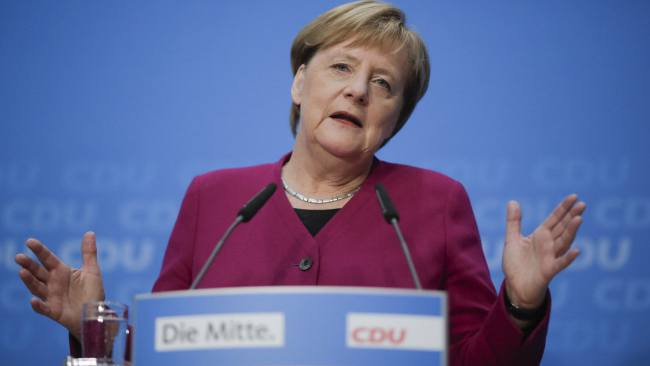
Editor's Note: Xing Hua is a research fellow at the China Institute of International Studies. The article was first published by China Plus on November 2, 2018. The article reflects the author's opinion, and not necessarily the views of CGTN.
German Chancellor Angela Merkel recently announced that she would not seek re-election as the leader of the center-right Christian Democratic Union (CDU) at the party's conference in December. She also announced that she will not seek re-election as chancellor in 2021, which will bring an end to her career in office.
This news has shocked the world. The German media has described Merkel's decision the end of an era.
Merkel, known as Germany's "Iron Lady", has been chairman of the CDU for 18 years, and chancellor for 13 years. She has led Germany steadily and decisively, and she has guided Europe through a difficult stage in its integration. She has dealt with many severe crises and had some extraordinary achievements.
Hailed as an outstanding stateswoman not only in Europe but also around the world, her personal style has won her wide acclaim. French daily Le Monde said that Chancellor Merkel's modesty, truth-seeking, and respectful human style is rare among today's world leaders.
As she prepares to bid farewell to her political career, she said, "I was not born a chancellor and I have never forgotten that." Her announcement that "It is time to start a new chapter" and her gradual retreat from public office demonstrated her approach of thoughtful consideration.
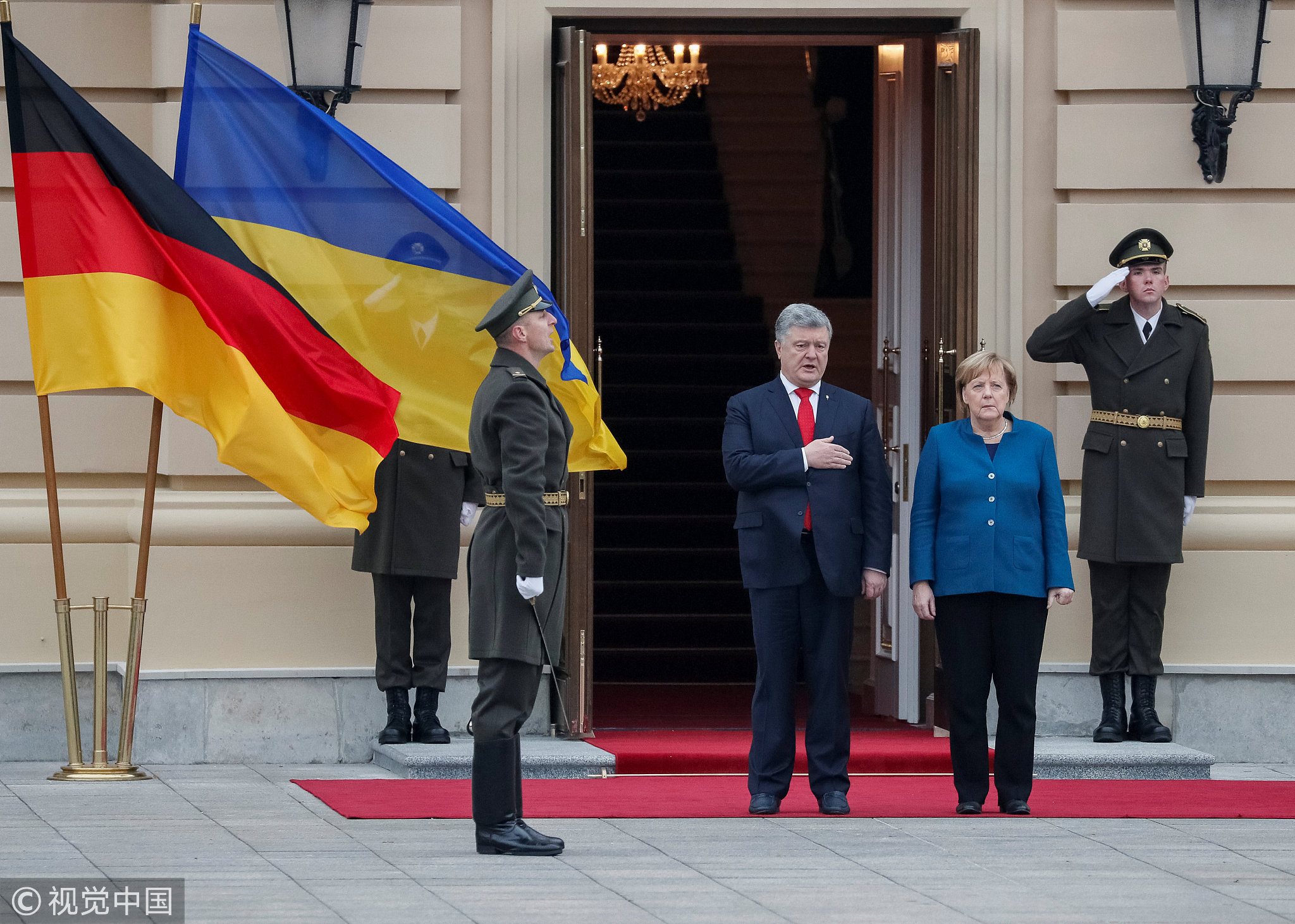
Ukrainian President Petro Poroshenko and German Chancellor Angela Merkel during a welcoming ceremony in Kiev, Ukraine, November 1, 2018. /VCG Photo.
Ukrainian President Petro Poroshenko and German Chancellor Angela Merkel during a welcoming ceremony in Kiev, Ukraine, November 1, 2018. /VCG Photo.
Merkel's reputation has been built through hard work and the heavy burdens that she has carried throughout her leadership.
In recent years, crises in Germany and the rest of Europe overlapped amid a changing political climate, and traditional European politics of the school represented by Merkel did not have much in reserve to respond effectively.
In the elections for the Bundestag last year, the two traditional major parties suffered a setback, and the populist opposition Alternative for Germany entered parliament for the first time, marking a turning point in the balance of the prevailing political forces.
At the same time, the country's ruling coalition lost its absolute majority as well as the right to form a cabinet, and negotiations with the other parties to form a new coalition also failed. In the end, the Social Democratic Party formed a joint cabinet with the center-right Christian democratic parties, namely the CDU and the Christian Social Union in Bavaria (CSU). This broke the embarrassing impasse, but it also shook Merkel's political roots in a way that continued to reverberate the following year.
At the end of last month, the ruling party lost again in the local elections, which became the straw that broke the camel's back. With the confidence that's needed to govern effectively gone, the chancellor of Germany and de facto leader of the European Union decided to gradually withdraw from politics. This move is the product of the serious deterioration in the political climate in Europe.
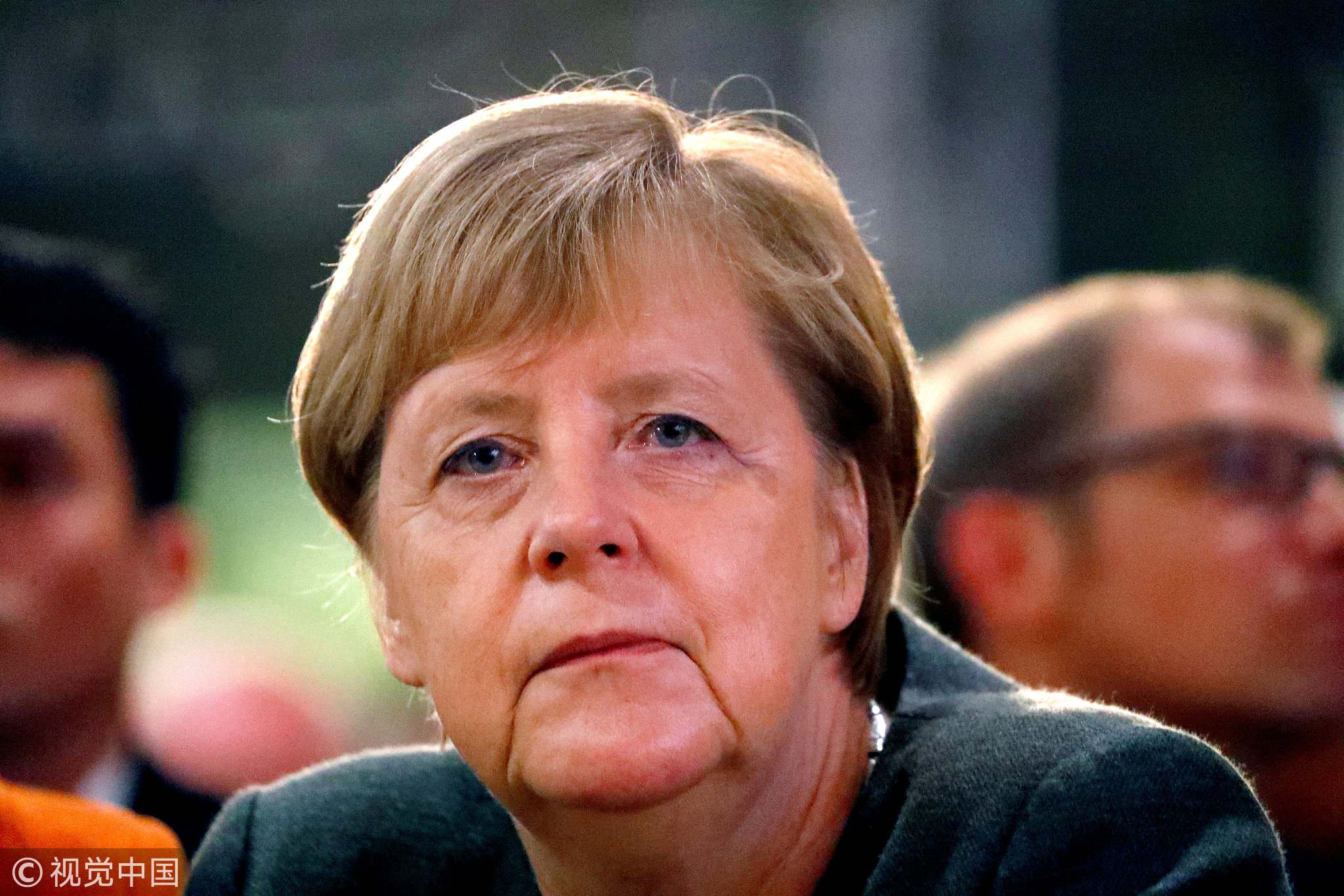
German Chancellor Angela Merkel at an election campaign rally in Ortenberg, Germany, October 22, 2018. /VCG Photo.
German Chancellor Angela Merkel at an election campaign rally in Ortenberg, Germany, October 22, 2018. /VCG Photo.
Two overarching factors have contributed to this deterioration. First of all, conflicts between the US and the EU have intensified. This has led to the development of a murky policy environment.
US President Donald Trump's "America First" policy has had a disrupting influence on European governance, and it poses a serious threat to Europe's economy, politics, and security. The US has launched a trade war against Europe as if it were an enemy, taking aim at Germany and even at Merkel directly.
And the recent threat by Trump to tear up the Intermediate-Range Nuclear Forces Treaty is expected to lead to a repeat of the Cold War nightmare when Europe was poised to become a battleground of a nuclear conflict between the US and Russia.
The American president wants its European allies to vigorously strengthen their readiness against Russia, but in doing so they risk worsening the security situation in Europe. This is a situation that many people in Europe would like to avoid.
The second factor that has contributed to the declining political environment in Europe is the rise of extremist and populist voices, which have gained strength in the face of Europe's struggle to deal with the problems of the influx of refugees, the need to reform the Eurozone, and the looming Brexit.
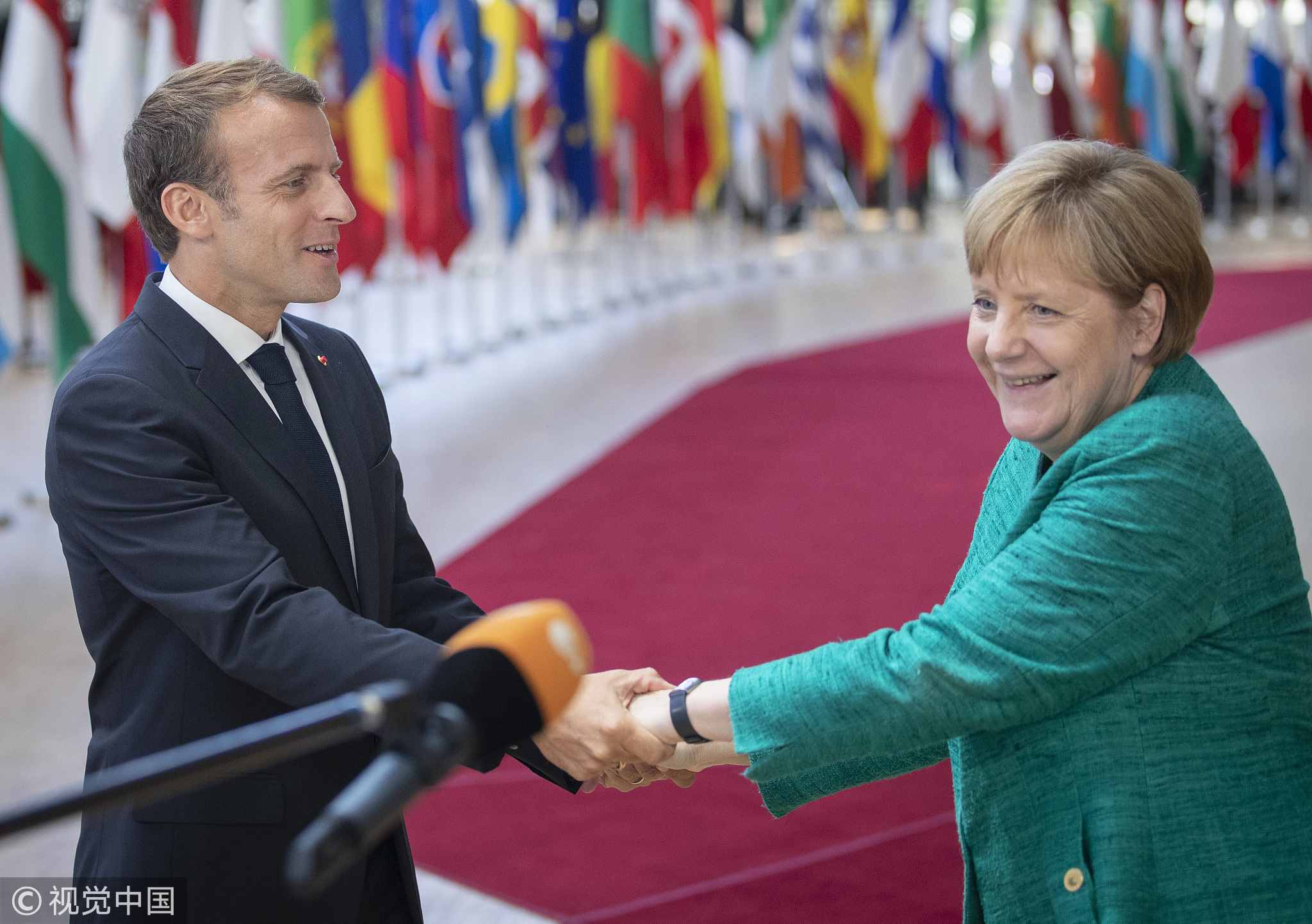
German Chancellor Angela Merkel greets French President Emmanuel Macron at the European Union leaders' summit in Brussels, Belgium, June 28, 2018. /VCG Photo.
German Chancellor Angela Merkel greets French President Emmanuel Macron at the European Union leaders' summit in Brussels, Belgium, June 28, 2018. /VCG Photo.
These voices have gained the upper hand in national politics in Italy and in parts of Central and Eastern Europe such as Hungary and Poland. The situation has not been helped by the disparaging voices coming from the US that have bad-mouthed the institution of the European Union itself.
Some American politicians have gone so far as to openly offer encouragement to nationalist right-wing forces in Europe, and in doing so are encouraging the destruction of European unity. The result has been that Germany's position as a leader of Europe has become increasingly tenuous. Poland and Greece have even retained the right to demand compensation from Germany for their losses during the WWII.
At the same time, public sentiment against globalization has been on the rise in Germany. The opponents of globalization, bored with traditional politics, are more concerned with defending their own interests and are increasingly dissatisfied with what they see as an overly generous approach to refugees, social welfare, and environmental protection.
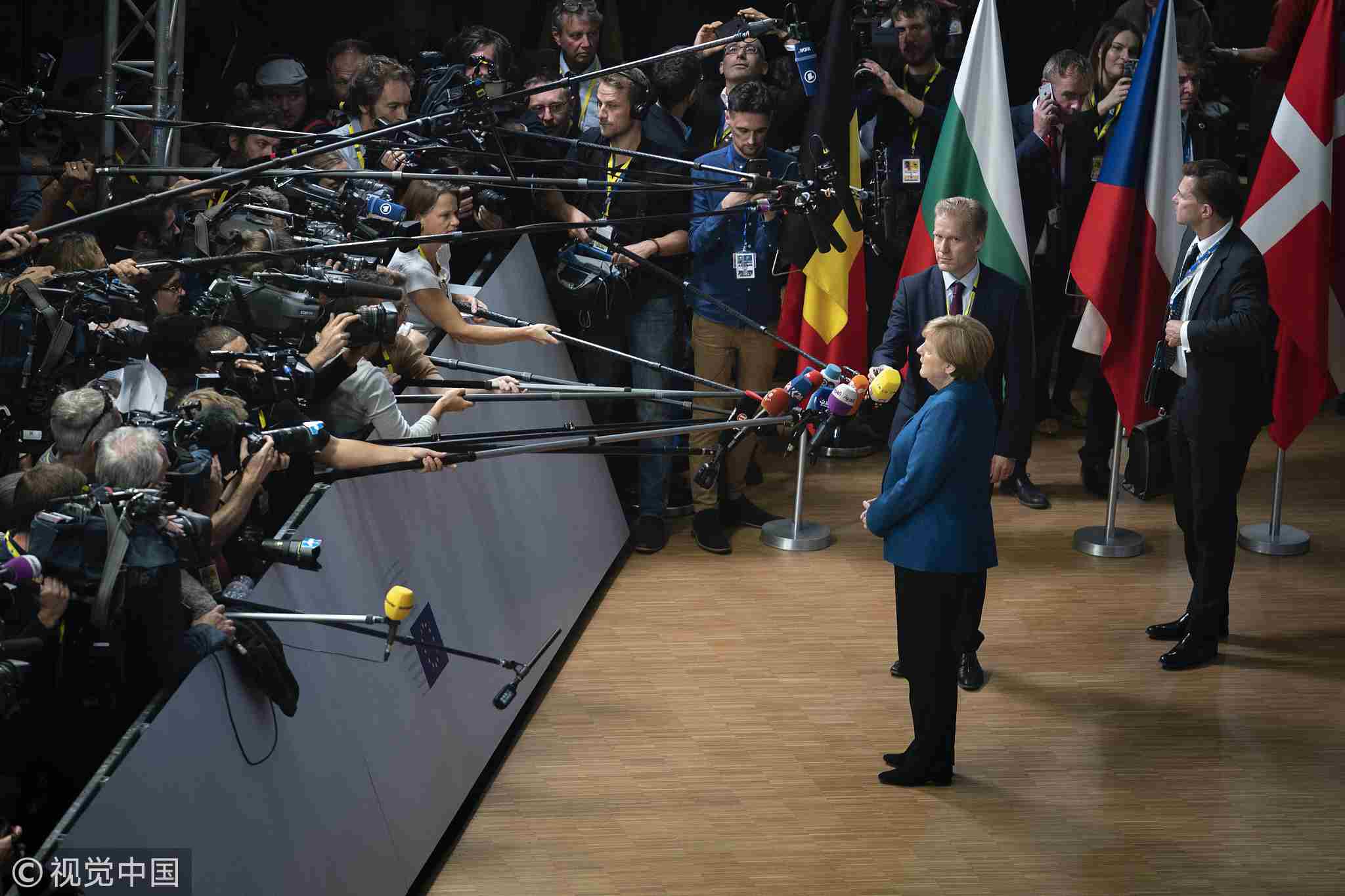
German Chancellor Angela Merkel during a press conference at the European Union leaders' summit in Brussels, Belgium, October 17, 2018. /VCG Photo.
German Chancellor Angela Merkel during a press conference at the European Union leaders' summit in Brussels, Belgium, October 17, 2018. /VCG Photo.
This has contributed to the growing tendency for Germany's political parties to focus more and more on their own competitiveness, which has in turn further aggravated the sense of social differences. There is discord among the ruling coalition, especially between the CDU and the CSU, and within the CDU itself.
It is against this backdrop that Merkel decided to announce that she would begin the process of retirement. Although several competitors are eager to become her successors, their prestige and ability to exert control is no match for Merkel.
The uncertainty that will follow her retirement will be unprecedented in recent times, and it is uncertainty that will be felt across all of Europe, judging from the public sentiment about the news of her impending departure.
The EU is facing difficulties with integration. It is reeling under US' swing towards unilateralism. And a decade on, the impact of the European debt crisis is still being felt. How Europe responds to this test of its resolve and values will influence the international environment for years to come.
(If you want to contribute and have a specific expertise, contact us at opinions@cgtn.com.)

SITEMAP
Copyright © 2018 CGTN. Beijing ICP prepared NO.16065310-3
Copyright © 2018 CGTN. Beijing ICP prepared NO.16065310-3